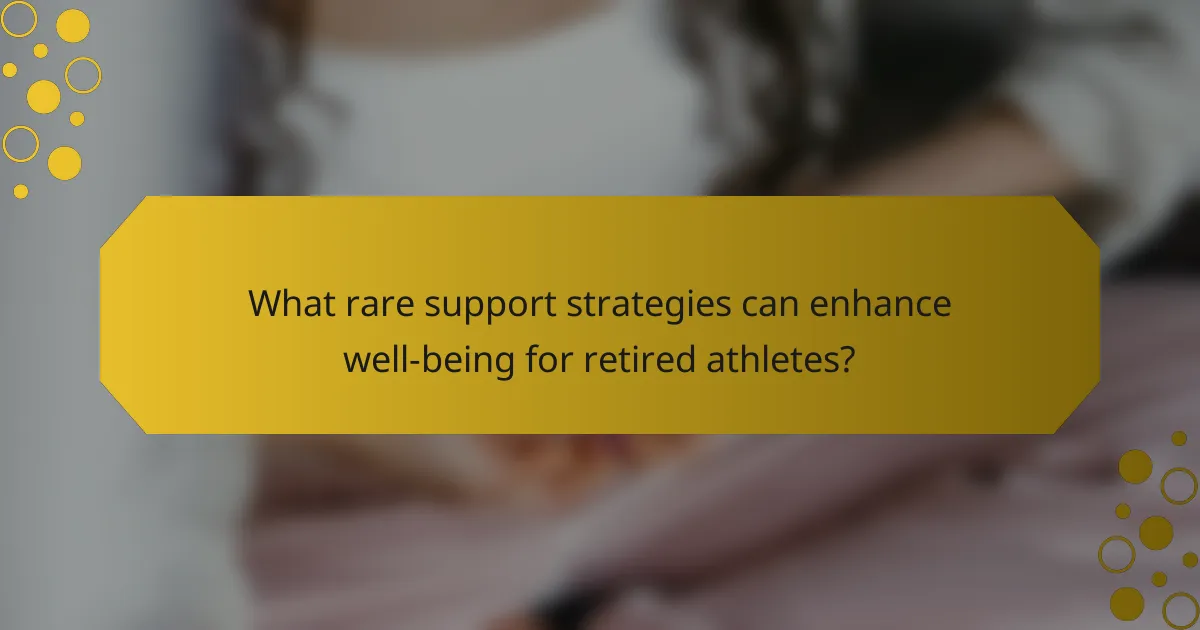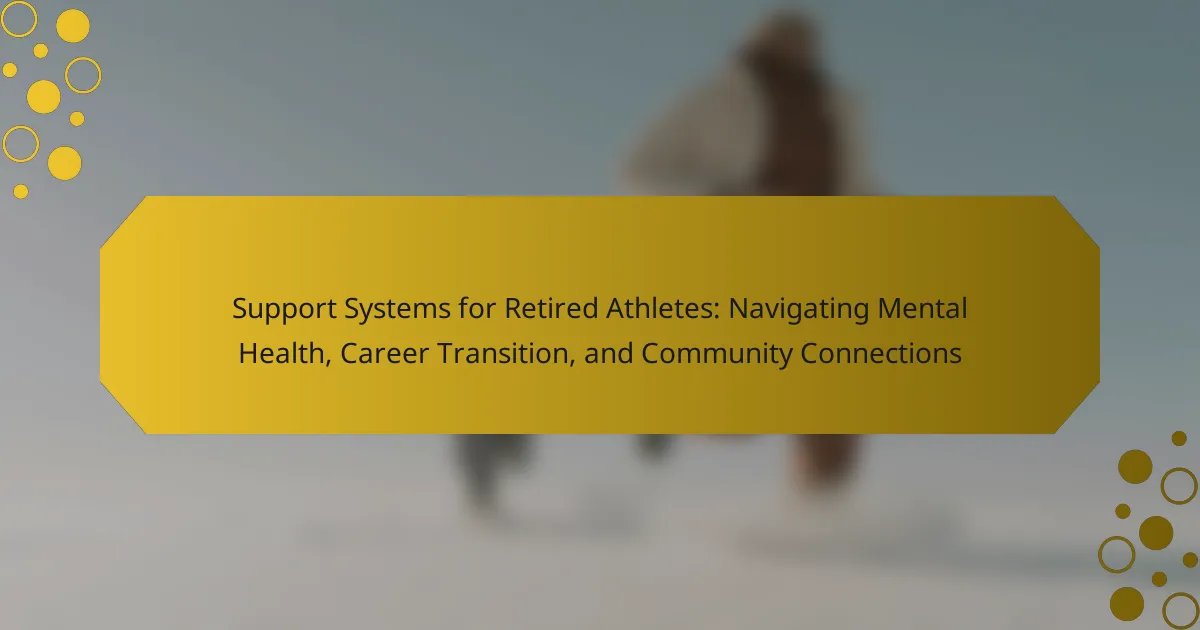Retired athletes often face challenges related to mental health, career transition, and community connections. Support systems like mental health counseling, career coaching, and peer support groups are essential for navigating these issues. Specialized resources address identity loss and emotional adjustment, while community engagement initiatives promote social connections. Together, these strategies create a holistic approach to enhancing well-being in retirement.

What are the essential support systems for retired athletes?
Retired athletes benefit from essential support systems that address mental health, career transition, and community connections. These systems include mental health counseling, career coaching, and peer support groups. Mental health counseling helps athletes cope with identity loss and emotional challenges. Career coaching provides guidance for new professional paths, leveraging their skills and experiences. Peer support groups foster community connections, allowing retired athletes to share experiences and build networks. Together, these support systems facilitate a smoother transition into life after sports.
How do mental health challenges impact retired athletes?
Mental health challenges significantly affect retired athletes by leading to issues such as depression, anxiety, and identity crises. Transitioning from a competitive career often results in a loss of purpose, making support systems crucial. Community connections and professional help can mitigate these challenges. Research indicates that retired athletes are at a higher risk for mental health issues compared to the general population. Establishing robust support networks can enhance their well-being and facilitate smoother career transitions.
What role does career transition play in mental well-being?
Career transition significantly impacts mental well-being by fostering resilience and adaptability. Support systems, including counseling and peer networks, provide essential emotional resources. Research indicates that athletes who engage in structured transition programs report lower anxiety and depression levels. These programs enhance self-esteem and promote a sense of purpose, crucial for maintaining mental health post-retirement.
What are the stages of career transition for athletes?
The stages of career transition for athletes typically include assessment, exploration, preparation, implementation, and reflection. Each stage addresses unique challenges and opportunities for personal and professional growth.
Assessment involves evaluating skills and interests outside of sports. Exploration focuses on researching potential career paths and educational opportunities. Preparation includes acquiring necessary qualifications and networking within chosen fields. Implementation is the actual transition into a new career, often requiring resilience and adaptability. Reflection allows athletes to evaluate their experiences and adjust their career goals as needed.
How can retired athletes identify their post-career identity?
Retired athletes can identify their post-career identity by leveraging support systems that focus on mental health, career transition, and community connections. Engaging with mental health professionals can provide essential guidance during this transformative phase. Networking with fellow retired athletes fosters a sense of belonging and shared experiences. Exploring new career opportunities through workshops and mentorship programs can help athletes redefine their purpose. Lastly, participating in community events strengthens social ties and enhances personal fulfillment.
What community connections are vital for retired athletes?
Community connections vital for retired athletes include peer support groups, mentorship programs, and local sports organizations. These connections foster emotional well-being, facilitate career transitions, and promote social engagement. Engaging with former teammates or athletes creates a shared understanding of experiences, enhancing mental health. Additionally, community involvement provides opportunities for skill development and networking, crucial for navigating post-athletic careers. Establishing these connections is essential for maintaining a sense of purpose and belonging in retirement.
How can networking improve mental health after retirement?
Networking significantly enhances mental health for retired athletes by fostering connections and support. Engaging with peers helps reduce feelings of isolation and promotes a sense of belonging. Studies indicate that social interactions can lower anxiety and depression rates, contributing positively to overall well-being. Furthermore, shared experiences among retired athletes can lead to valuable mentorship opportunities, facilitating smoother career transitions. Building a community provides emotional support, encouraging individuals to navigate challenges collectively, which is crucial for mental health post-retirement.
What local organizations support retired athletes?
Local organizations that support retired athletes include non-profits, community centers, and sports associations. These entities provide resources for mental health, career transition, and social connections. For instance, the Professional Athletes Foundation offers financial assistance and counseling services. Additionally, the National Alliance for Mental Illness provides support specifically tailored for athletes facing mental health challenges. Local community sports clubs often host events that foster networking and community engagement among retired athletes.

What unique mental health resources are available for retired athletes?
Retired athletes have access to unique mental health resources tailored to their specific experiences. These resources include specialized counseling services, peer support groups, and mental health workshops designed for athletes transitioning from professional sports.
Support networks like the Professional Athletes Foundation provide tailored assistance for emotional well-being. Programs such as the Athlete Transition Program focus on career development and mental health, helping athletes adapt to life after sports.
Additionally, many organizations offer online platforms where retired athletes can connect with mental health professionals who understand their unique challenges. These resources emphasize community connections, fostering a sense of belonging and support during the transition period.
How do tailored mental health programs benefit retired athletes?
Tailored mental health programs significantly benefit retired athletes by providing personalized support during their transition. These programs address unique challenges, such as identity loss and social isolation, enhancing emotional resilience and community connections. Evidence shows that athletes participating in structured mental health initiatives report improved well-being and a smoother adjustment to post-career life. Additionally, access to professional counseling and peer support fosters a sense of belonging, which is crucial for mental stability.
What unique challenges do female retired athletes face?
Female retired athletes face unique challenges such as identity loss, mental health issues, and limited career transition support. Many struggle with redefining their purpose after sports, leading to feelings of isolation. Research indicates that women often have fewer resources for mental health support compared to their male counterparts. Additionally, societal expectations can hinder their reintegration into the workforce, creating barriers to successful career transitions. Community connections are vital, yet many retired female athletes report a lack of networks tailored to their needs.
How can retired athletes access professional mental health services?
Retired athletes can access professional mental health services through various support systems, including therapy networks, community organizations, and athlete-focused programs. Many organizations provide tailored resources to address mental health challenges specific to athletes. For instance, the Professional Athletes Foundation offers counseling and mental health support. Additionally, retired athletes can seek assistance from licensed therapists who specialize in sports psychology. Networking with fellow retired athletes can also lead to valuable recommendations for mental health professionals.

What rare support strategies can enhance well-being for retired athletes?
Retired athletes can enhance their well-being through unique support strategies like peer mentorship, tailored mental health programs, and community engagement initiatives. Peer mentorship fosters connection by pairing retired athletes with those in transition, offering shared experiences and guidance. Tailored mental health programs address specific challenges faced by retired athletes, focusing on identity loss and emotional adjustment. Community engagement initiatives encourage participation in local sports or wellness activities, promoting social connections and physical health. These strategies create a holistic support system that addresses both psychological and social needs.
What innovative programs exist for athlete reintegration into society?
Innovative programs for athlete reintegration include mentorship initiatives, mental health workshops, and career coaching. These programs focus on mental health support, skill development, and community engagement. For example, organizations like the Professional Athletes Foundation offer tailored resources to help athletes transition successfully. Additionally, community-based programs foster connections, providing a sense of belonging and purpose. These systems address unique challenges faced by retired athletes, enhancing their overall well-being and societal reintegration.
How can retired athletes leverage technology for mental health support?
Retired athletes can leverage technology for mental health support through various platforms and tools. Digital therapy apps provide accessible counseling options, while online support groups foster community connections. Wearable devices can track mental wellness metrics, enhancing self-awareness. Virtual reality experiences offer immersive relaxation techniques, aiding in stress management. Social media can serve as a space for sharing experiences and building supportive networks.

What are the best practices for retired athletes in managing their mental health?
Retired athletes should prioritize building strong support systems to effectively manage mental health. Engaging with peers who understand their experiences fosters connection and reduces feelings of isolation.
Establishing routines can also aid in career transition. This helps create a sense of normalcy and purpose. Furthermore, seeking professional counseling can provide tailored strategies for coping with the psychological challenges of retirement.
Participating in community activities enhances social interactions and strengthens bonds. Volunteering or coaching can provide fulfillment and maintain a sense of identity.
Lastly, maintaining physical health through regular exercise is crucial. Physical activity has proven benefits for mental well-being, contributing to overall resilience in retirement.
How can retired athletes build a sustainable support network?
Retired athletes can build a sustainable support network by actively engaging with their communities and leveraging existing relationships. Networking with fellow athletes fosters shared experiences and emotional support. Joining local sports clubs or alumni associations enhances connections and provides mentorship opportunities. Seeking professional help, such as counseling or coaching, addresses mental health concerns and aids in career transitions. Participating in community service or outreach programs creates a sense of purpose and belonging. These strategies collectively strengthen social ties and promote well-being.
What common mistakes should retired athletes avoid during their transition?
Retired athletes should avoid neglecting mental health, underestimating the importance of community, and failing to seek professional guidance. Transitioning from sports can be challenging, and support systems are crucial. Many athletes struggle with identity loss, which can lead to depression. Building a network of peers who understand this experience can provide emotional stability. Seeking career counseling can help identify new opportunities aligned with their skills.
What actionable steps can retired athletes take to prioritize mental health?
Retired athletes can prioritize mental health by establishing strong support systems, engaging in community activities, and seeking professional help. Building relationships with fellow athletes provides a shared understanding of challenges. Participating in local sports or wellness programs fosters connection and purpose. Regular consultations with mental health professionals can address specific concerns and facilitate coping strategies.
